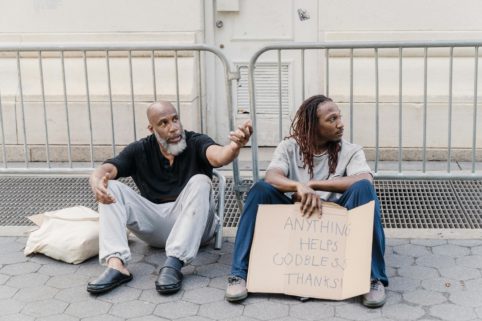How Do I Truly Help Panhandlers?
 James Whitford
James Whitford
Founder & CEO
Read more from James
Listen to this article:
Just about all of us have encountered a panhandler with a sign that reads, “Anything helps.”
But is that true? Does anything really help?
Years ago, Kenny came off the streets to our shelter and while searching through his backpack, we came across a 12” x 12” piece of cardboard containing four messages he used while standing on the center median at stoplights.
One read, “Hungry, blesst are you,” which he used if someone seemed willing to give him cash with no questions asked. Another said, “Food stamps, ½ price.” That was for motorists he thought were looking to make a deal.
If you looked compassionate and sappy-hearted, he flashed, “Cold, wet, and cast out for nearly a month.” Finally, serious “just give me the facts” types saw, “Traveling, lost ID, need work, God bless.”
Obviously, Kenny’s intelligent but dishonest tactics means it’s worth thinking more carefully about how we “help” panhandlers.
That need is even more acute when one considers at least two studies indicate around ninety percent of panhandlers are addicted. Since those studies relied on self-reporting, that number is probably higher. If you’re like us, knowing there’s more than a ninety percent chance the cash we hand someone will feed an addiction means it’s time to rethink the way we’re giving.
Along those lines, in Renewing American Compassion, Marvin Olasky says Jesus’ words that whatever we do for the least of these brothers of His, we do for Him (Matthew 25:40) should challenge us to ask: Is giving money to panhandlers they use for drugs akin to sticking heroin in Jesus’ veins?
That’s sobering. And it leads to the obvious conclusion just anything doesn’t help.
The question is, “What does?” How can we assist someone from life on the streets to a life of self-sufficiency? Here are three takeaways to consider:
First, remember incentives.
Paying someone for standing on a corner only incentivizes standing on a corner, so don’t hand out money. Instead, create a card with a list of ministries or services committed to the appropriate kind of help and hand that It may not be what the panhandler wants at the moment— but if you give it with sincere encouragement, at some point they may pull it out and realize it’s just what they need.
Second, take them up on the offer.
A common panhandling sign reads, “Will work for food.” Put that to the test. Consider how to employ that person in something simple to see if they really mean it. It could be as simple as helping you wash your car or picking up trash in the area. You could also invite them to a nearby fast food restaurant so you can get to know them and discern what their true needs are.
Third, get your community on board.
If you’re bothered by panhandlers’ suffering, consider how to motivate your community to do something about it. We can provide you with scripts for public service announcements and billboard designs your city can use to truly help those stuck on street corners.
We’re happy to report that Kenny finally escaped the streets. Giving up a life of panhandling was certainly part of that. If you and I will think about incentives, offer work to those who need it, and get our communities on board to do the same, today can be another day we go out there, fight poverty … and win.




